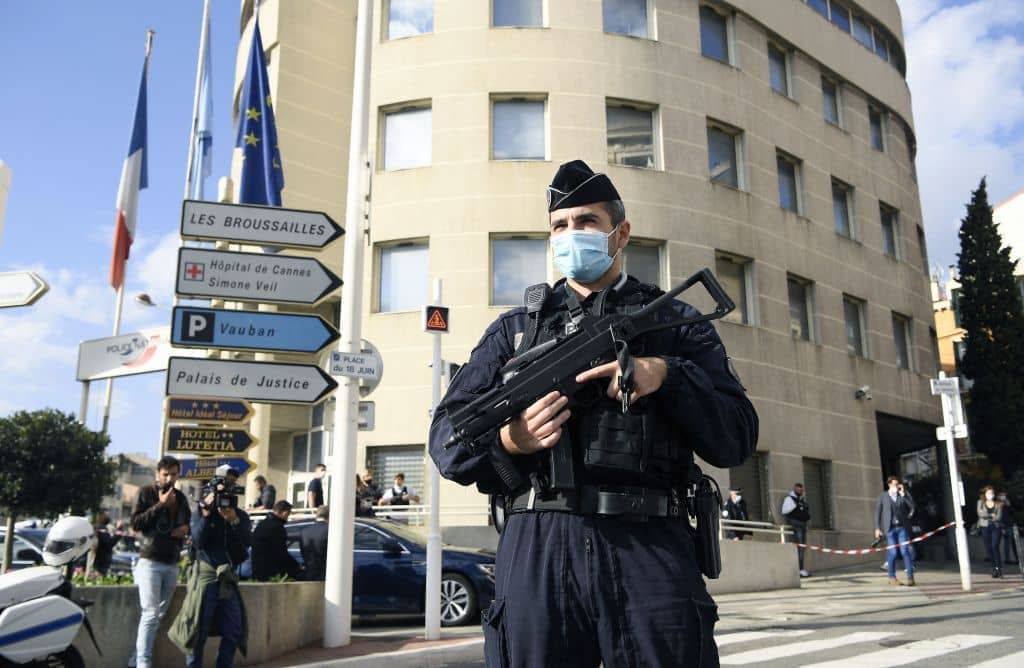A French police officer was attacked with a knife in Cannes this morning. The victim – whose bullet-proof vest saved him from serious injury – was at the wheel of his stationary car when the assailant opened his door and plunged the weapon into his body. There are reports that the attacker uttered the words ‘in the name of the Prophet’. The man was ‘neutralised’ by another policeman and is now in a serious condition in hospital.
As the attack unfolded, left-wing MP, Mathilde Panot, appeared on a popular morning radio show and was asked about her party’s controversial stance on giving weapons to police officers. Panot is a member of La France Insoumise (LFI), the party led by Jean-Luc Mélenchon, which, in the 2017 presidential election, exceeded expectations in winning a 19.5 per cent share of the vote in the first round.
Things don’t look so rosy this time around: a weekend poll that canvassed voters’ intention in 2022 put Mélenchon at just eight per cent, way behind Emmanuel Macron (25 per cent), Eric Zemmour (16.5 per cent) and Marine Le Pen (16 per cent). Mélenchon even lags five points behind the uninspiring centre-right candidate Xavier Bertrand, but at least he can take comfort in the fact he is the best-placed candidate on the left, though that’s not saying much. The Socialist’s representative, Anne Hidalgo, managed to poll only five per cent. Left-wing politicians in France have not only lost touch with their electorate but some are in danger of losing touch with reality.
Should the British Bobby be held up as a a paragon of policing?
Certainly Panot’s appearance on the radio is unlikely to have boosted her party’s standing among the undecided voter. The first question she faced was about her party’s campaign pledge to disarm the police. Surely not wise, suggested the presenter, given the appalling violence to which the police are routinely subjected. On average, each day in France 105 police officers are attacked physically or verbally, an increase of 60 per cent over two decades.
Panot said that her party wished to disarm the police only during protest marches, pointing out that during the Yellow Vest demonstrations several men and women suffered serious injuries to their eyes and hands from police weapons such as the controversial flash-ball.
A small number of police officers did use indiscriminate and unacceptable violence during those fractious months. In general, however, the discipline of the police was admirable, particularly when the far-left Black Bloc hijacked the Yellow Vest movement, and looting and vandalising became a regular Saturday afternoon occurrence.
It has been instructive to note that during the anti-Covid Passport demonstrations across France there has been little violence, even during the height of the movement in the summer when nearly a quarter of a million men and women took to the streets. That was because the thuggish far-left element that so often attaches itself to social causes was not present. They did make an appearance in Nantes at the end of last month, venting their fury at the presence of Eric Zemmour in their city. Had the police not been armed the mob may have succeeded in gaining access to the venue where Zemmour was speaking.
France has a police force but what La France Insoumise advocate is a police service, more pacific and less confrontational; as Panot put it, ‘a model more British, where you have not only police officers but sociologists and citizens’.
Should the British Bobby be held up as a a paragon of policing? Perhaps Panot is unaware of the grooming scandals of Rotherham, Rochdale et al. I’m unaware of a French policeman skateboarding with environmental activists, or a French policewoman backing a pro-Palestine protest. The French police don’t take the knee, nor do they patrol in cars decked out in Pride colours. And I’m certain no French copper has ever turned tail and fled the way Met officers did last summer during trouble in Brixton.
The French police are not perfect but they are still a force to be reckoned with. The same can’t be said of the French left, whose reputation and credibility is on the wane, not unlike that of the British police service.







Comments